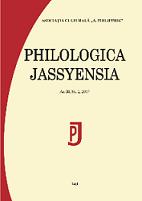Despre feminitatea limbii române
The Feminity of the Romanian Language
Author(s): Irina PetraşSubject(s): Literary Texts
Published by: Editura Tracus Arte
Keywords: romanian language; gender of nouns; poetry
Summary/Abstract: The author uses one of Eminescu’s famous phrases: The Language, Our Mistress. In Romanian, the «mastery» – when languages are involved – implies both the meaning of domination/ manipulation of the man by the language and the meaning of good knowledge/ command of a certain language. The author takes into account both of them. Her essay takes as a starting point the assumption that the mother tongue influences the Weltanschauung. Worlds and Words interweaves the reading diary with fragments of personal diary, retains from a vast bibliography those sentences congruous with the assumption stated above and directs the research towards the noun (Hauptwort in German) and its genders. The Romanian language reveals its «sexual eye». The feminity (there are mainly the feminine nouns that enter the definition of the Romanian dimension of the being) with its obvious bias towards androgyny (the Romanian hasn’t got a neuter but rather an ambigenus that names things with a «double personality», androgynous) could explain many characteristics of the Romanian man. The bad reputation of European languages in what the analysis and interpretation of genders is concerned in also due, in the author’s opinion, to the fact that the strength and the expressivity of feminine nouns would have contradicted the subordinate, inferior, feminine condition of the «second sex». In the He-story unjust and male chauvinist rules still persit defying reality. The gender, as one can easily notice, operates not only in the case of those «sexual eyed» languages (Romanian, French, German, Russian), but also in that of the English, for instance, where the absence of gender is replaced by the freedom to sexualize the objects at will, according to context and to the relation the speaker establishes with the objects. The second section, Sexual eye and the poetry (Genosanalyses), calls examples from the Romanian and foreign poetry to back up the idea that the gender of nouns organizes the written space, imposes certain nuances to the poetic perspective, deepens the specificity in perceiving the world. There are as many worlds as languages and poetry will always best attest it.
Journal: Philologica Jassyensia
- Issue Year: II/2006
- Issue No: 2 (03)
- Page Range: 85-113
- Page Count: 30
- Language: Romanian

